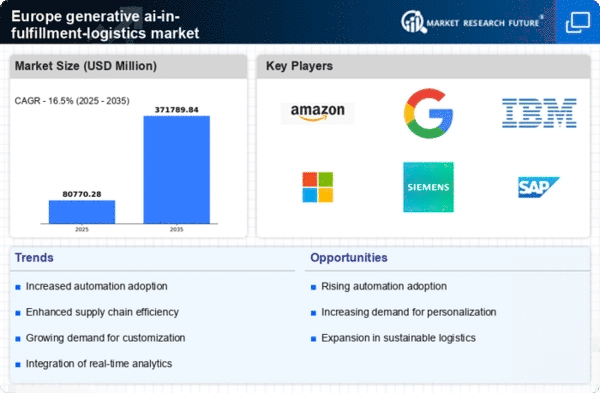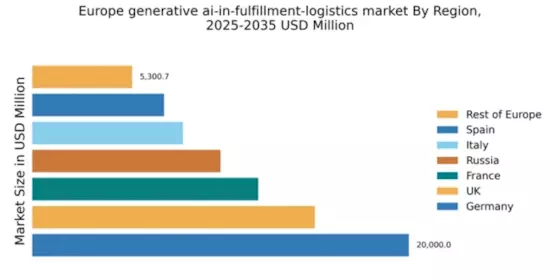Advancements in Robotics and Automation
Advancements in robotics and automation technologies are significantly influencing the generative ai-in-fulfillment-logistics market. The deployment of autonomous robots in warehouses and fulfillment centers is streamlining operations and reducing labor costs. These robots, powered by generative AI, can optimize picking and packing processes, leading to faster order fulfillment. In Europe, the market for warehouse automation is expected to exceed €5 billion by 2027, driven by the increasing adoption of robotic solutions. This trend not only enhances operational efficiency but also addresses labor shortages in the logistics sector, making it a crucial driver for the future of fulfillment logistics.
Integration of AI with IoT Technologies
The integration of artificial intelligence (AI) with Internet of Things (IoT) technologies is emerging as a pivotal driver in the generative ai-in-fulfillment-logistics market. This convergence allows for enhanced visibility and control over supply chain operations. IoT devices generate vast amounts of data, which, when analyzed through generative AI algorithms, can lead to improved inventory management and predictive maintenance. In Europe, the IoT market in logistics is expected to reach €10 billion by 2026, indicating a robust growth trajectory. This integration not only streamlines operations but also reduces costs, making it an attractive proposition for logistics companies aiming to optimize their fulfillment processes.
Regulatory Compliance and Data Security
In the context of the generative ai-in-fulfillment-logistics market, regulatory compliance and data security are becoming increasingly critical. As logistics operations become more digitized, the need to adhere to stringent data protection regulations, such as the General Data Protection Regulation (GDPR), is paramount. Companies are investing in generative AI solutions that not only enhance operational efficiency but also ensure compliance with these regulations. The European market for data security solutions in logistics is projected to grow by 20% annually, reflecting the heightened focus on safeguarding sensitive information. This driver underscores the importance of integrating compliance measures into AI-driven logistics strategies.
Rising Demand for Real-Time Data Processing
The generative ai-in-fulfillment-logistics market in Europe is experiencing a notable surge in demand for real-time data processing capabilities. As businesses increasingly rely on data-driven decision-making, the ability to analyze and act on data instantaneously becomes crucial. This trend is particularly evident in sectors such as e-commerce and retail, where timely information can significantly enhance customer satisfaction and operational efficiency. According to recent estimates, the market for real-time data analytics in logistics is projected to grow at a CAGR of approximately 25% over the next five years. This growth is likely to drive investments in generative AI technologies that facilitate rapid data processing, thereby transforming fulfillment logistics operations across Europe.
Shift Towards Customization and Personalization
The generative ai-in-fulfillment-logistics market is witnessing a shift towards customization and personalization of services. As consumer preferences evolve, logistics providers are increasingly leveraging generative AI to tailor their offerings to meet specific customer needs. This trend is particularly pronounced in the e-commerce sector, where personalized delivery options can enhance customer loyalty and satisfaction. Market analysis suggests that companies that adopt personalized logistics solutions may see a revenue increase of up to 15% within the first year of implementation. This growing emphasis on customization is likely to drive further investment in generative AI technologies, enabling logistics firms to adapt swiftly to changing consumer demands.

















